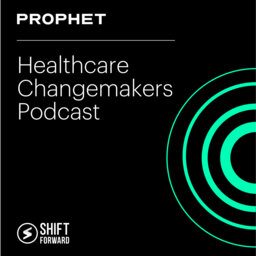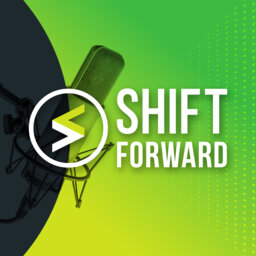Healthcare Changemakers
Prophet’s Healthcare Changemakers podcast is where healthcare leaders who are driving change in their organizations, as well as today’s healthcare exp…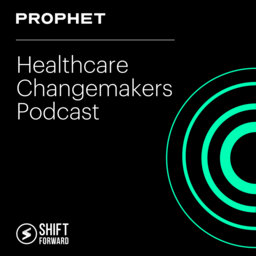 Darrell Johnson of RLDatix14:43
Darrell Johnson of RLDatix14:43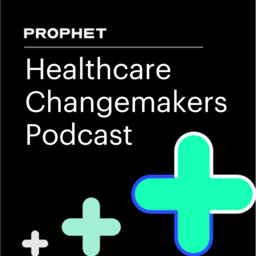 Austin Chiang MD of Medtronic21:42
Austin Chiang MD of Medtronic21:42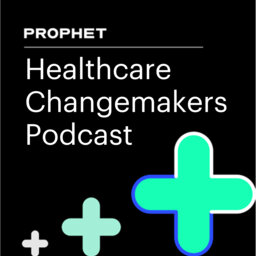 Prakash Patel MD of MaxHealth33:05
Prakash Patel MD of MaxHealth33:05 Alyssa Jaffee of 7wire Ventures24:54
Alyssa Jaffee of 7wire Ventures24:54 Jim Rogers of Mayo Clinic28:31
Jim Rogers of Mayo Clinic28:31 Faisel Syed MD of ChenMed28:43
Faisel Syed MD of ChenMed28:43 What We've Learned About Changemakers23:19
What We've Learned About Changemakers23:19 Thomas Cornwell MD of Village Medical at Home28:56
Thomas Cornwell MD of Village Medical at Home28:56 Dan Liljenquist of Intermountain Healthcare27:39
Dan Liljenquist of Intermountain Healthcare27:39 A. J. Loiacono of Capital Rx27:50
A. J. Loiacono of Capital Rx27:50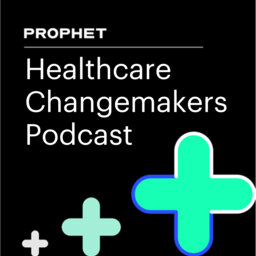 Jamey Edwards of StartUp Health28:42
Jamey Edwards of StartUp Health28:42 Ed Marx of Divurgent27:04
Ed Marx of Divurgent27:04 Geoffrey Roche of Core Education PBC21:22
Geoffrey Roche of Core Education PBC21:22
Paul, Jeff, Lindsey, Priya, and senior editor Anna Kuno look back at 2022 and look ahead at what's next, including a new name for the podcast. The hosts reflect on topics that have stood out, lessons they have learned, and things that have surprised them, as well as why the show is now called Healthcare Changemakers.
And. Hello. Welcome to Prophets Healthcare Transformers podcast, where we'll be talking to leaders in healthcare who are focused on transforming their organizations to drive the next level of growth for their business and for health care. Hosted by Priya in Asia, Lindsay Moseby Paul Strength and Jeff Gordy. Transformation is one of those terms that has a lot of layers to it. Sometimes it's about innovation. Sometimes it's about shifting the way you do business. Sometimes it's to your overall operating model and other times it's to a specific department or function. It's also about people helping them navigate the discomfort that comes with change, but also motivating them to engage in the journey of transformation from the CEO to the newest employee. It's a journey, and that's why we created this podcast to break down this multidimensional, dynamic topic of transformation one story at a time. Are you ready to dive in? Hi, I'm Anna, senior editor of the Health Care Transformers podcast. Thanks for joining us. As we look back over this podcast past year and look ahead to what's next, it's always insightful to take a moment and reflect on some of the most important topics that were discussed on the show, things that surprised us and things that we learned over this past year. So who better to have on today's podcast than the host themselves? For today's special edition episode, we're joined by the hosts of Health Care. Transformers seem to be calling something new. But more on that later. Priya, Lindsay, Jeff and Paul, welcome.
Thanks, Anna.
Thanks for getting us together.
It's great to be on this side of the microphone.
So Paul, let's start with you. When you look back on the year and all the episodes that we did. What's sort of the first thing that comes to mind?
I can't help but think back to the first episode. There is just so many things going through my mind. We had an issue where what Chief clinical officer of bamboo health and things kicked off with. Tell me about yourself and something people might not know. And it was funny that you came out of the gates going as almost a Canadian astronaut. That's pretty cool. And then for her to go into all the things that she was working on at open beds now, bamboo health, going deep in the opioid crisis and epidemic and overprescription and mental health, and talking about all these issues that are in the forefront of health care right now with somebody who has stood up and run an organization being folded into a bigger organization and thinking to myself during that conversation, going, if these keep up, this is going to be amazing. And it really has. But I just go back to that first episode going, This is really cool and this is the exact kind of conversations we need to be having more of and highlighting real things and real people driving transformational change in the market. Well, I think first thing first for me is that we did all of those podcasts. There's parts about each of them individually that were wonderful, but I'm so glad that we actually spent time and sort of put in what was, you know, not insignificant effort to do all of those and to gather all those voices and to listen to all those stories and to get all of that expertise and be able to package all of that up and then put it out there on products platform for for others to hear and to hopefully benefit from as well. So now there's a million podcasts out there, but being able to have one that's kind of curated to the type of not only the type of work that we do, but with the types of voices that we would love to amplify in the market. I'm just really glad that we did that period.
I think for me, I think about just when I thought I understood the breadth of transformation required in health care, right? The need for providers to shift toward value based delivery of care and everything that means for patients, the need to bring, you know, digital technology into the patient experience and etc., etc.. Then I listened to AJ from Capital Eric's or Dan, you know, little inquest Intermountain Health Care talk about the need for disruption and the whole way drugs are developed come to market, price distributed and just the list goes on and on and all of our guests, you know what I love that we've done and I guess I come from so many different angles. They've highlighted just how complex it is, but the topic is so many different angles and perspectives.
Yeah, I'll lean into that a little bit. Jeff You know, for me it was just how diverse these experiences of leading a transformation can be. For some folks, it was really about, you know, leading an internal mindset shift and how to make that happen. And for others, it was about changing the entire business model, the company that they are working at and the way that things are done in health care. So it really exposed all the different facets of transformation that that you could be thinking about. Yeah. And I think also on top of that, I've been impressed with, I want to say almost every one of our conversations, there was some sort of a catalyst in their personal life that spurred them to do this. So this kind of braiding or intersection of personal passion and professional passion has really been coming through in a lot of these stories. What I've also liked about these conversations is not just understanding transformation, but the people behind it. Those people driving the change, making the change happen has been very insightful in terms of how things get done.
Paul Do you have a specific example of why many you particularly liked to and that was the case?
Yes, it's one of those that we think about which stands out. It was my my conversation with Michelle last year of Boehringer Ingelheim. And if you listen to the episode, I don't think I've even told anybody about this, but you can actually feel a different episode in the front half and in the back half. And I didn't know she was going to go there, but I went into something with like, what was the story? What spurred it? And she paused and she described the moment when she was a child and came home to find out that her brother had committed. Suicide. And it really threw me for a loop because we do interviews all the time and I normally try to predict where is it going to go. I didn't know how to field that next set of questions. So as a moderator, that kind of freaked me out in the mechanics. But the other piece is once that settle down, the mood and the authenticity and the comfort in conversation on that back half was rich. And it's just you could you can almost see the first half and the back half and you see that individual for Michele. Why is he so passionate about what she does? How she can link the business issues and transformations into a personal story and find it very relatable. But that one was a moment I'm not going to forget.
Yeah. To your point, Paul, about I remember listening as well, and it was a little bit of a head snap moment for me on the point of really personal inspiration. You know, our characters are Daniel and Quest, who started as a lawyer in estate economics, became a lawyer, went to politics, eventually came back to health care, and is now stood up a generic drug company to manufacture insulin where it all start. And he's got I think he said two or three of his brothers have type one diabetes. And they've just been you know, he's watched the importance of that and the cost of that and all the things broken with that his whole life. And, you know, as the careers of all these come back and tackle it head on.
What about you? Is there a particular episode, either of yours that you like to really stood out to you or one of somebody else's that you liked?
Yeah. You know, I really enjoyed interviewing Stella Sanchez of Teladoc Health. She just had a great perspective on bringing mindfulness into the transformation journey. I had never heard someone talk about things in that way, but then I thought about it a little bit more and I realized these last two, almost three years that we've gone through with the pandemic, so many of us tried to embed mindfulness into our day to day lives and to think about leading a transformation during that time. I thought it was a really rich perspective that she shared, and she had some great practical tips, too, about just how to get a transformation done inside an organization. It's one thing to have the vision and the idea for it. It's another thing entirely to know how to make it happen. And I just thought she did a wonderful job of articulating that. Jeff, I got to say, your interview with Dan Mullen was also just phenomenal. He had so many rich insights to share about Intermountain Health. And I really love the Segway into the the economics behind drug pricing. Just as a little bit of a University of Chicago nerd on the line here. I love that economic perspective and how that created the impetus for Civic are so great conversation. I think some of the most important things I learned from my conversation with Jamie Edwards of Startup Health was how increasingly important it's going to be to look to the emerging organizations, the the venture industry, the startup communities for, you know, the real sort of game changers and innovative ways of sort of moving the industry forward. And maybe alongside that, I think the other thing that he was really saying was, of course, the big the main players in health care, whether that's pharma or the payers or, you know, health systems, of course, they are going to continue to be the sort of the foundation for the health care system, but it's the impact of bringing in all of these new potentially younger but certainly less entrenched voices that the startup health community is really amplifying is going to be huge. The change is going to come from outside. It's not only going to come from inside. Has to be a little bit of both, of course, But what he and that team is doing to sort of push voices that otherwise wouldn't really get a seat at the table into the spotlight is incredibly important.
What would you say is some of the most important things are that you learned from doing this podcast over the past year?
I think I talked I spoke earlier about the different angles, the elements of health care that need to be transformed. Adding to that point and to your question, Ana, it's the diversity of players trying to do it. Now, again, somewhat a function of the guest roster we put together, but you've got what I'll call the big established players like Intermountain, like Mass General, bring them. You've got some kind of more small regional but established companies. Nick Patel at Prisma Health, who was an example of that. And then you've got the, you know, the small, scrappy startups trying to find their angle, and you've got the people like CVS who have not historically been retailers that are becoming health care companies.
There's an interesting, again, imperfect description clash of thinking or diversity of thinking. Probably a better way of putting it, but I. But my favorite quote so far this year was Jeff's interview with Matt Glover Summit. And he asked a question which I think we all thought we should be asking, which is, well, what about people's need for a relationship with their physician? And you can almost feel him leaning the microphone like, that's the thing. I'm not trying to sell them a relationship and trying to sell them easy access to care. And it's like those those diverse thinking of it is it kind of came through is like we're asking the wrong question. We're solving for the wrong problem. I'm trying to provide easy access to care while people are asking about how do we hold on physician relationships. I don't think either one's right or wrong, but you see the energy and the dynamism in some of these Q-and-A questions or Q&A sessions that I think I find insightful and entertaining at the same time.
Yeah. And on that note, Matt had one of my as I was kind of looking back, one of my one of the ideas that kind of stuck with me was this vision of trying to create a modern health system without hospitals. Right? Which is just a really interesting idea. And, you know, I think Matt's point answer, Matt's point would be that hospitals clearly have a need. Right? And sometimes eventually all of us are going to need hospitals for an awful lot of our health care. We don't. And there's a whole lot that, you know, in his case, some it can do to provide health care for people without a hospital. And organizationally, as you know, as he said and others have said, hospitals are big, important assets in the center of the system, but they also can slow you down. And that's something I know he's wrestled with in his past.
Yeah, I think that that take makes sense in theory, but it was something that I think stuck out and kind of surprised me as a as a new opinion. Was there anything that particularly surprised you for many of the episodes?
I think maybe coming back to your point, Paul, about how so many times folks personal experiences impacted how they approach transformation? In my conversation with TAM, we talked a lot about kind of creating a diverse playing field. Sometimes we don't talk about that enough in health care. You know, we talk about DTI sort of as its own topic, but health care has got a long way to go in terms of addressing issues like maternal mortality rates for black women, our issues around patient's pain not being taken seriously depending on their race. Tim did a lot to articulate how to create a diverse trading environment inside her company, and I was grateful that she shared that perspective because it wasn't something that I was expecting in the conversation. It certainly wasn't something I had questions planned around. But she, you know, she went there and described it as a part of her own personal philosophy. And I think it was just a good wake up call for all of us to be thinking about. Yeah, for sure. I think there's a long way ahead of us on that. I think the conversation with John, a head of diversity equity inclusion at CVS Health, was interesting, which is we're sitting on a set of issues or just problems that have manifested themselves over years. And for us to think that that's going to quickly change is a bit of a naivete. But we can begin tackling it. But we do need to be much more thoughtful, systematic about chipping away at this because it's quite literally ingrained into too many things.
To your point, Paul, I think one thing that I liked about Joni's conversation was identifying sort of almost a silver lining of what's happening over the past few years with COVID. I feel like it's bringing up a lot of the issues with health care and inequality to the forefront, and hopefully they're sort of getting more of that attention that they need now. So to sort of close us out, I want to look ahead to the future. And I'm curious to know from all of you, what are you most looking forward to with either the podcast or generally with health care in 2023?
I'll I'll take a stab at that one, Ana. As a team here, I've been batting around ideas about how the different sectors in health care are blurring. And we started to explore that in a couple of podcasts, but I'd love to see more of that happen next year in particular. There's there's four trends we've been focused on. The first one is really about the connected and empowered health consumer and how that's opening up new avenues of of direct care. The second one was the expansion of the.
Delivery.
Ecosystem and everywhere care. So to Jeff's point about the hospitals and the only place that we've got to go for care, a lot of that hospital or the whole transformation has been happening and every root and point along the way. I'd love to hear more from our our podcast interviewees about that. The third one was about the acceleration, about value of value based care. And the last one was about the democratization of data. And so I think we've scratched the surface on some of those, you know, some of those trends and topics this year, and I think a lot. Of our podcast interviewees perspectives has helped us shape our point of view around this. But there's still so much more for us to explore when it comes to how different sectors are blurring the lines in health care. I am most looking forward to interviewing some people from outside of traditional health care, so I would love for us to invite in some folks from nutrition. From sport. From wearables and smart apparel. And people that sit outside of the normal health care industry, but who are absolutely poised to make a big impact or to help sort of change the way we think of care delivery today. Currently, I'm on this kick around nutrition, so I would love to interview somebody from an H-E-B or a Whole Foods or one of the larger grocery chains or chains or CVS to talk about how access to healthy food is actually the business of health care. It's not just the business of groceries, it's the business of health care, right? If we actually believe that better nutrition is a way of keeping millions of people from getting type two diabetes and then potentially progressing to type one or obesity or lots of other chronic conditions, then we need to be looking at medicines to fix that. But also, what are the ways that we could keep people from getting sick in the first place? And access to healthy food and not just what you're going to get from your corner gas station out of a plastic bag. I would love to talk to again to people sort of outside of our normal pick picks. Yet another one that I'm fascinated by is again, sort of wearables and smart fabrics, whether that's silver, an colloidal silver infused fabric that is actually healing to fabrics or materials that are sensing hydration. Not everybody wants to wear smartwatch. Not everybody can afford a smartwatch, but where there innovations being tapped into that are going to really sort of move the needle and make it again, make it make that sort of advanced technology and the insight that it drives more available to more people. I think that would be really fascinating. I agree. I think in building on that, I think what I'm hoping to see more of is more tangible progress. It's hard to have a conversation, I guess, in this decade without talking about the pandemic, but I guess I'll just go there to be on topic. But with health care, it was already was lagging so far behind on so many consumer related things, business operating needs where we hit the pandemic. And it was a wake up call. A lot of quick fixes were put into place. And then we began rethinking things with a little bit more seriousness to it. So we've kind of gone through a scrappy mode, too, a orientation mode, and I think we're now going to be moving into a chapter of of getting stuff done. And that's what's been really great about these conversations, is it's real people doing real things. And we're beginning to take these white papers and this thought leadership and being able to connect it with what do you go do about it, What can you expect and have some optimism knowing that it progress is being made? And that's what's getting me really excited as we move into next year and beyond.
Yeah, we get into the middle of next year where all of a sudden, you know, three plus years since the start of the pandemic, I remember saying a lot to my anyone who would listen right in the early days when no one was going in for colonoscopies and no one was going in for these quote unquote, elective procedures, that didn't always sound so elective. Right. We I think we are starting to see a picture more and more that some of those procedures just went away and just didn't happen. Right. Some were pent up and are coming back, but by and large, a lot went away. So we've kind of lived a social science experiment, Right? What does that mean? And I think it will probably play out over a decade. But I wouldn't be surprised if, you know, as we get into the middle of next year, we start to see some real time studies coming back and just look at what actually happened to population health and overall outcomes and where were they negatively affected by delays in procedures and where do we learn that maybe we didn't need to do as many. Right. And to look in both the outcome data over time and start to see some of the economic data that comes back over time. Again, I think it will emerge over and over more than just the next 6 to 12 months. But I think we're starting to see some of that next year.
Thank you so much, Judge Lindsay and Paul. I'm really looking forward to seeing what we can accomplish in 2023. And speaking of the future of the podcast, I mentioned at the opening that the podcast will be getting a slight name change. So Priya, can you tell us more about that?
So profit health care has come up with a philosophy about our work that we think is really central to transformation. We believe the organizations that thrive in health care are those that dare to change the game, striving to improve human health, create better experiences and make the best of care an enduring and sustainable reality for all. A profit We help ambitious change makers transform care experiences, create new enterprises and build more empathetic, sustainable ways of working that deliver superior value for healthier, happier humans and more successful businesses across health care. Those that will transform health care are the change makers, and we exist to be their champions for change. So for this podcast, we recognize that we need to focus not just on the transformation itself or really dial into and recognize the people that are behind the transformation, the ones that are making the change happen. So moving forward, we're going to be re titling the podcast Health Care Change Makers to reflect that.
Interestingly, big organizations tend to reward people and allow them to get at the top by minimizing risk. Right. It's a rare person who can be a change maker and actually get into a position within a big organization to drive change. We've been really lucky that we found a few of them, and I'm looking forward to showcasing more of them. Right. So you've got the big organizations that are risk averse. You've got the smaller organizations which are by nature, you know, total risk takers but don't have don't have the influence. But finding those on the up and up change makers that are kind of scaling that organizations or those that have managed to thrive and succeed in a big organization are really the most exciting clients for us to have. And going forward, the most exciting podcast for us to have on. We've had a few and I'm looking forward to having more next year.
Health Care Changemakers. I love it. Thank you again. Bridge and Paul Lindsey. I'm so excited to see what's in store for this podcast. I'm Anna, senior editor of the Healthcare Changemakers Podcast. Thanks for listening.
 Shift Forward Health
Shift Forward Health